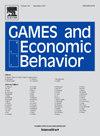选举中的政策赌博和价码
IF 1
3区 经济学
Q3 ECONOMICS
引用次数: 0
摘要
我们研究了当选民既关心政策又关心候选人的态度时,现任政治家的战略政策实验。在我们的模型中,选民不知道其理想政策的位置,并通过经验学习,反过来,公职人员通过政策制定来控制选民学习。因此,现任总统面临着一个权衡:是实施一项接近他自己理想观点的政策,还是一项促使选民学习的最优数量以赢得连任的政策。在均衡中,在位者如何解决权衡取决于他的预期价。我们发现,落后的现任者有时会比在没有选举激励的情况下实施更安全的政策,尽管需要产生新的信息来赢得选举。此外,增加现任者的预期价值(从而获得选举优势)可以激励他在平衡状态下进行更多的赌博。然而,选举安全和实验之间的这种关系主要取决于价格维度的不确定性。本文章由计算机程序翻译,如有差异,请以英文原文为准。
Policy gambles and valence in elections
We study strategic policy experimentation by an incumbent politician when voters care about both policy and the candidates' valence. In our model, the voter does not know the location of her ideal policy and learns via experience, in turn, the officeholder uses policymaking to control voter learning. The incumbent thus faces a trade-off between implementing a policy close to his own ideal point, or one that induces the optimal amount of voter learning to win reelection. In equilibrium, how the incumbent solves the trade-off depends on his expected valence. We find that a trailing incumbent sometimes implements a safer policy than he would absent electoral incentives, despite needing to generate new information to win the election. Furthermore, increasing the incumbent's expected valence (and thus electoral advantage) can motivate him to gamble more in equilibrium. However, this relationship between electoral security and experimentation depends crucially on the amount of uncertainty on the valence dimension.
求助全文
通过发布文献求助,成功后即可免费获取论文全文。
去求助
来源期刊

Games and Economic Behavior
ECONOMICS-
CiteScore
1.90
自引率
9.10%
发文量
148
期刊介绍:
Games and Economic Behavior facilitates cross-fertilization between theories and applications of game theoretic reasoning. It consistently attracts the best quality and most creative papers in interdisciplinary studies within the social, biological, and mathematical sciences. Most readers recognize it as the leading journal in game theory. Research Areas Include: • Game theory • Economics • Political science • Biology • Computer science • Mathematics • Psychology
 求助内容:
求助内容: 应助结果提醒方式:
应助结果提醒方式:


